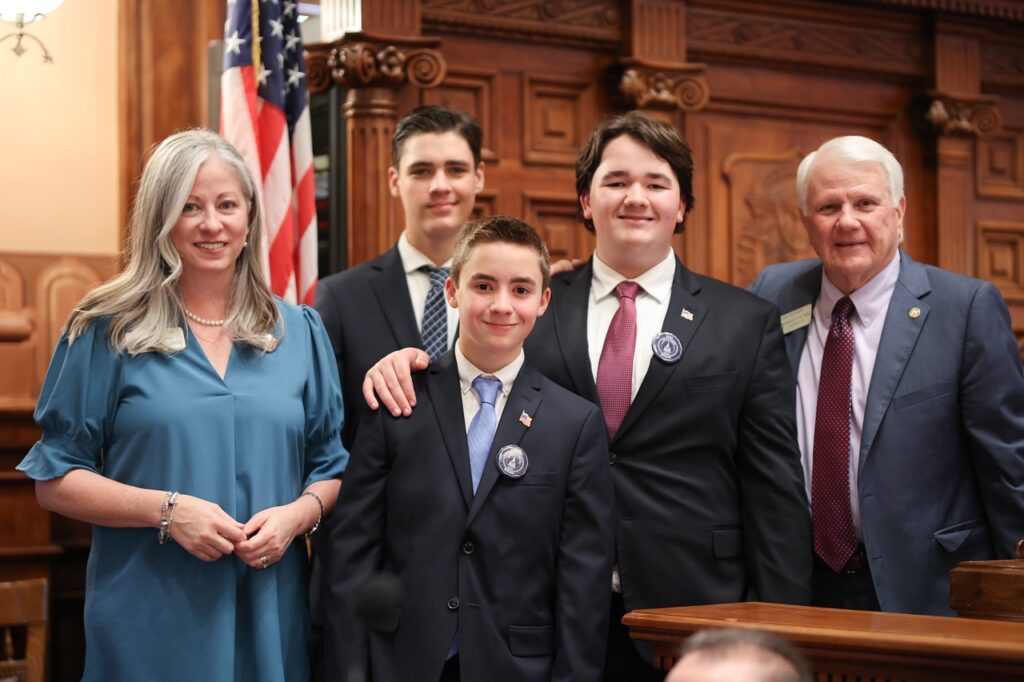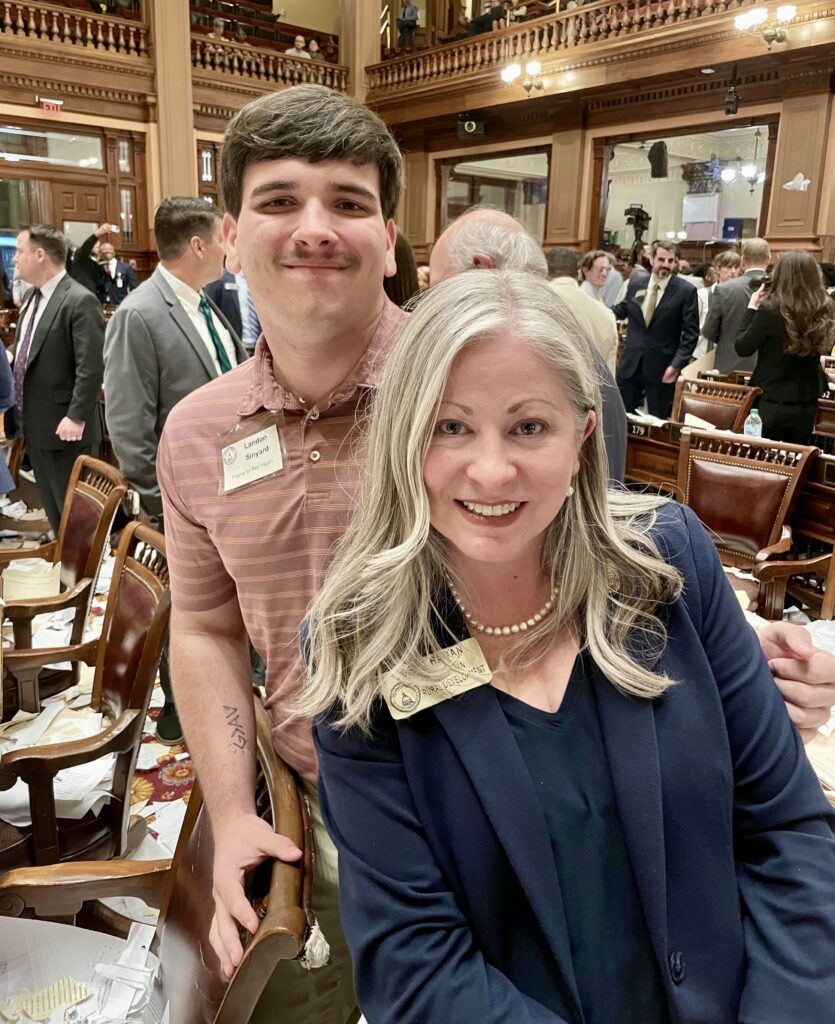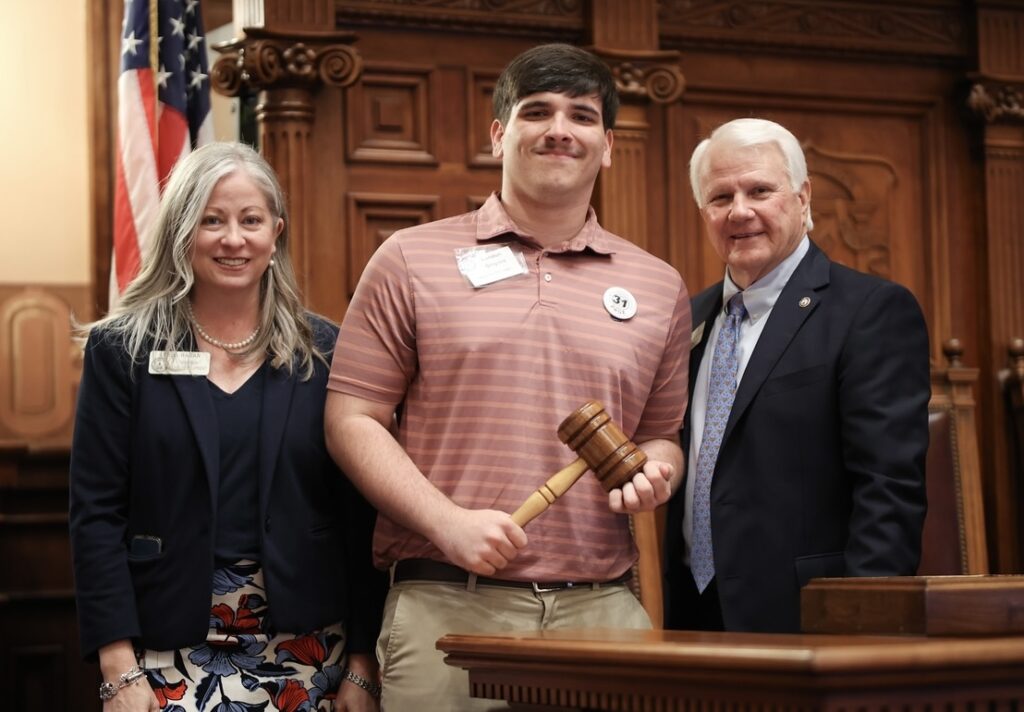As the 2025 legislative session ended under the Gold Dome, I was honored once again to represent our values, our families, and our rural communities. We worked long hours in the final week—often well past sunset—debating, amending, and voting on legislation that impacts every corner of Georgia. This final session update gives you a clear picture of the bills that made it through both chambers and await Governor Kemp’s decision. I’ll also share about one important that bill that unfortunately didn’t make it to the governor’s desk.
Let’s dive into the highlights, especially the policies that touch our schools, small towns, and local hospitals.
Strengthening School Safety
As a former teacher, I know firsthand how important it is to protect our students and educators. That’s why I was proud to support House Bill 268, a sweeping school safety measure that received final passage during the last week of session.
This bill includes several key provisions:
- Enacts Ricky and Alyssa’s Law, requiring school systems to install mobile panic alert systems that connect directly with emergency responders.
- Mandates schools to obtain detailed building mapping by July 1, 2026, to be shared with local and state agencies during emergencies.
- Requires quick transfer of students’ educational and behavioral records, ensuring new schools have a full picture of a student’s needs.
- Requires schools to build behavioral threat assessment plans and include them in their safety procedures by 2027.
By taking a proactive approach, HB 268 helps our educators identify threats before they happen while giving our students the support they need. If signed into law by Governor Kemp, this will be a powerful step forward for school safety support across Georgia.
Preparing Rural Hospitals for Emergencies
Living in a rural area shouldn’t mean you’re left in the dark—especially when storms hit. That’s why I supported Senate Bill 170, a bill that sets up a new grant program to help rural hospitals install backup generators.
Here’s how it works:
- Hospitals with fewer than 100 beds in rural counties are eligible.
- Grants will help them buy and install generators, especially in areas hit by a state of emergency after July 1, 2024.
- The Department of Community Health and GEMA will coordinate the program, focusing first on hospitals with no backup power.
After what we experienced with Hurricane Helene and other storms, I know how important it is that our rural hospitals stay up and running. SB 170 is a commonsense solution to make sure our loved ones can still get care when disaster strikes.
Protecting Female Spaces & Sports
The Riley Gaines Act (SB 1) is common sense legislation that acknowledges differences between females and males. Three of the main points of the new law are:
- amending various titles in state law to provide for separate restrooms and changing areas for males and females during athletic events in schools and postsecondary institutions.
- providing for separation according to sex for sleeping arrangements on school trips.
- requiring all public schools, local school systems, and private schools participating in competitions or athletic events to designate each team, competition,n or athletic event as for males, females or coed.
Expanding Small Business Opportunities
For over two years, I’ve worked on a bill that will expand opportunities for licensed cottage food operators. House Bill 398 received final passage in the Senate and has been sent to the governor’s desk. Currently, cottage food operators must sell their products directly to their customers. This bill allows them to also sell via a third party such as a grocery store or restaurant. One of my main priorities is supporting small businesses, and this bill will allow these entrepreneurs to reach more potential customers.
Final Passage on Key Healthcare and Education Bills
Several other important bills received final passage on Sine Die—the final day of session—and I’d like to share just a few highlights in this final session report:
Senate Bill 101: Ensures health insurance plans include coverage for orthotic and prosthetic devices when medically necessary. These devices are often essential for people to work, move freely, and live independently.
House Bill 307: Expands the Georgia Early Literacy Act to include dyslexia. It’s now called the Georgia Early Literacy and Dyslexia Act. It also bans the “three-cueing” method and aligns teacher training with science-based reading practices. I know our teachers will appreciate this added clarity and support!
Senate Bill 93: Requires state-approved teacher training programs to match the science of reading standards. This helps ensure our future educators are prepared to teach every student how to read—especially those who struggle the most.
Senate Bill 148, which would amend the Quality Basic Education Act to allow local school boards to offer hunting safety instruction for students in grades six through 12. Each local board of education would also be authorized to establish a curriculum for hunter safety instruction based on the hunter education courses offered by the Department of Natural Resources. The bill would also increase the number of personal days school personnel may utilize as accumulated sick leave for from three days to five days;
Supporting Our Veterans and Military Families
Veterans deserve more than a thank you—they deserve real support. House Bill 266 increases the income tax exclusion on military retirement benefits to $65,000 for retirees under 65. This bill is now awaiting the governor’s decision, and if signed, it will be a big win for many military families right here in southeast Georgia.
Other Senate Bills that Passed the House the final week of session
The House of Representatives passed many other bills the final week of the 2025 legislative session including:
- Senate Bill 20, which would expand eligibility for the Public Safety Memorial Grant to include spouses of law enforcement officers, firefighters, prison guards, emergency medical technicians or highway response operators who have died or been permanently disabled in the line of duty. The bill would provide for the distribution of grants to the child or spouse of a public school teacher or public school employee who has been killed or permanently disabled by an act of violence in the line of duty;
- Senate Bill 36, the Georgia Religious Freedom Restoration Act, which would permit state and local governments to substantially burden a person’s exercise of religion only if the entity demonstrates that the application of the burden to the person is in furtherance of a compelling governmental interest, and it is the least restrictive means of furthering that compelling governmental interest. Nothing in this bill would be construed to affect the Establishment Clause of the First Amendment of the U.S. Constitution;
- Senate Bill 100, which would allow an adult who was adopted to request and receive a copy of their original Georgia birth certificate following payment of a fee. A parent, sibling or descendant of a deceased person could receive a copy of the decedent’s birth certificate under the same procedure;
- Senate Bill 121, which would require individuals convicted of driving under the influence in Georgia to obtain higher minimum motor vehicle liability insurance coverage. Enhanced insurance coverage would be required to be maintained and uninterrupted for three years in order to requalify for a standard rate;
- Senate Bill 125, which would provide a modernization update to the licensing code for electrical contractors, plumbers, conditioned air contractors, low voltage contractors and utility contractors;
- Senate Bill 130, which would expand the ability for a resident or fellow to be taught in a teaching hospital or a medical facility that meets the stated criteria. The bill would also allow a resident or fellow to apply for the service cancelable loan program through the Georgia Board of Health Care Workforce;
- Senate Bill 140, which would authorize a doctor of optometry to dispense and sell pharmaceuticals that are related to the treatment of diseases and conditions of the eye, except those that are controlled substances;
- Senate Bill 179, which would amend state law to implement a new graduation requirement. Beginning in the 2031-2032 school year, students would be required to complete a computer science course or a career, technical and agricultural education (CTAE) course embedded with computer science in grades eight through 12 to graduate;
- Senate Bill 185, which would prohibit the use of state funds or resources for sex reassignment surgeries, hormone replacement therapies or sex characteristic altering cosmetic procedures or prosthetics for state inmates;
- Senate Bill 191, which would allow for electronic delivery of decisions by the Department of Labor involving unemployment insurance. The applicant could elect to use this electronic delivery or have their paperwork mailed to them;
- Senate Bill 201, which would protect homeowners entering into contracts with home repair contractors in the wake of a natural disaster. Contractors entering into a contract with a homeowner within one year of a natural disaster would be required to accept contract cancellation if all or part of the homeowner’s insurance claim is not covering their loss. Contractors would also be required to notify homeowners of their right to cancel;
- Senate Bill 204, which would prohibit counties and municipalities from regulating the storage of firearms;
- Senate Bill 207, which would allow a person who plead guilty as a first offender and successfully completed the terms of his or her sentence to be certified and employed as a firefighter at the council’s discretion, upon meeting the requisite qualifications;
- Senate Bill 212, which would prevent the disclosure of confidential voter registration record information to unauthorized persons and prohibit the disclosure of public student directory information for political use. The bill would also prevent students from being solicited to organize political events on school property when such event is otherwise prohibited by law or by policy of the local school system or school;
- Senate Bill 244, the Wrongful Conviction Compensation Act, which would provide that if a motion is made to disqualify a prosecutor based on improper conduct, and it results in disqualification, the defendant would be entitled to reasonable attorneys’ fees and costs. These costs and fees would be paid from the county treasury;
- Senate Bill 259, which would require a physician holding a child in temporary protective custody to make reasonable efforts to inform the child’s parents of their right to obtain an independent medical evaluation or pediatric specialty consultation. The bill would also require the physician to inform the Division of Family and Children Services of the basis of their determinations regarding suspected abuse or neglect and whether a physical examination was conducted and what medical records were reviewed.
A Missed Opportunity to Address School Zone Cameras
Over the past few years, I have heard from many of you regarding speeding tickets you have received in the mail from school zone cameras. The amount of frustration these cameras have generated around the state is extraordinary. House Bill 651 would establish significant guardrails around the use of these cameras, ensuring they would only be used as a true school safety measure. Although the House passed this bill, the Senate was not in their chamber to agree to it. Just after 9:00 pm on the last day of session as the House debated this bill, the Senate abruptly adjourned. Instead of going back to the Senate for a simple agree vote and then heading to the governor’s desk for a signature, it will now have to wait until next January.
What Happens Next
The legislative session may be over, but the work continues. Governor Kemp now has 40 days from the end of session to sign or veto bills that received final passage. If a bill isn’t signed or vetoed during that period, it automatically becomes law.
Meanwhile, we’ll begin the study committee process during the interim. That includes meetings of standing committees like Rural Development, where we’ll explore the issues that impact our communities most—whether that’s agriculture, healthcare access, or economic development.
Visitors to the Capitol
- I was so proud that two brothers from Wheeler County served as Pages in the Senate. Camden and Clayton Dixon and their parents, Janie and Ryan, spent legislative day 39 with us.

- On Sine Die, Landon Sinyard of Fitzgerald served as a House Page. He stayed until the very end, and I appreciate his help and dedication.


- Trish Poole and Joyce Kinney of Toombs County also visited on Sine Die.
Our Final Session Update: Let’s Stay in Touch
While we take a break from the House floor, I’ll be back in the district, attending meetings, listening to your concerns, and preparing for next year’s session. If there’s an issue that affects you, your family, or your business, please don’t hesitate to reach out. I want to hear from you. Email me at Leesa.Hagan@house.ga.gov or visit LeesaHagan.com for updates.
As I wrap up this final session update of 2025, I’d like to thank you again for the honor of serving. I’m proud to be your voice in Atlanta—and I’ll keep working hard to make sure our district has what it needs to grow and thrive.
